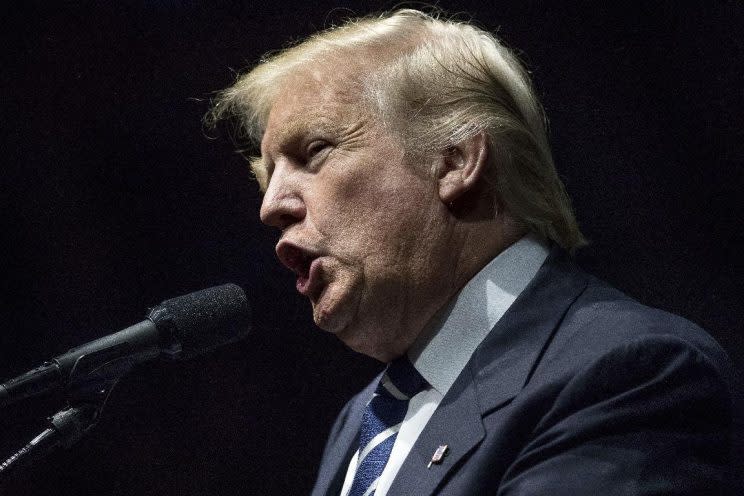Donald Trump says ‘nobody really knows’ if climate change is real
Despite overwhelming scientific consensus, President-elect Donald Trump claimed “nobody really knows” whether climate change is real when confronted Sunday with his inconsistent statements on the issue.
Fox News anchor Chris Wallace asked Trump where he stands on the environment, given that he’s variously called climate change a hoax and said he has an open mind about the issue.
“I’m still open-minded. Nobody really knows. I’ve, look, I’m somebody that gets it. And nobody really knows. It’s not something that’s so hard and fast,” Trump said on “Fox News Sunday.”
That’s actually not true. The vast majority of scientific organizations have said the scientific evidence for the climate system’s warming is unequivocal. These include the Intergovernmental Panel on Climate Change, the American Geophysical Union, the American Physical Society, the U.S. National Academy of Sciences, the U.S. Global Change Research Program and many others.
The American Association for the Advancement of Science, for instance, has said, “The scientific evidence is clear: global climate change caused by human activities is occurring now, and it is a growing threat to society.”
In the Fox News interview, as in most instances in which Trump discusses climate change, the president-elect did not counter any data from peer-reviewed scientific journals that demonstrate the impact of greenhouse gases emitted by human activities on the environment. Instead, the former real estate magnate focused on the effect he thinks government regulations would have on the U.S. economy.
He said other countries, like China and Mexico, are “eating our lunch” by building plants quickly, without waiting for governmental approval. He said permits and regulations intended to protect the environment often wind up killing jobs.

“We can’t let all of these permits, that take forever to get, stop our jobs,” the former real estate magnate said.
These arguments suggest that Trump is far more concerned about protecting businesses than the environment. It’s important to note (because this point often gets lost in the ruckus of partisan politics) that it is possible to acknowledge the scientific evidence of anthropogenic climate change and still believe in free-market principles.
For instance, republicEn is an organization of conservatives and libertarians dedicated to promoting “free enterprise” solutions to the climate crisis rather than subsidies or regulations, which they consider ineffective.
Wallace also asked Trump where he stands on two specific environmental issues: the Paris Agreement and the Dakota Access pipeline.
Trump has vowed to pull the United States out of the Paris accord, in which 194 nations committed to reducing greenhouse gas emissions to stave off the most devastating effects of climate change.
“You’ll have a decision pretty quickly,” Trump told Wallace. “And also, the Keystone Pipeline [a separate system that transports oil between the U.S. and Alberta, Canada], you’re going to have a decision fairly quickly.” He continued, “Now, Paris, I’m studying. I do say this — I don’t want that agreement to put us at a competitive disadvantage with other countries. As you know, there are different times and different time limits on that agreement. I don’t want that to give China or other countries signing agreements an advantage over us.”
Trump declined to say what he might do regarding the controversial Dakota Access pipeline, which would pass less than one mile from Standing Rock Reservation in North Dakota, because it might “be solved” by the time he enters the White House and he does not want to “create enemies” on either side of the issue if it isn’t necessary.
“But I will tell you when I get to office, if it’s not solved, I’ll have it solved very quickly,” he said. When asked if that means he will start the pipeline, Trump continued, “I’m not saying anything. I just say something will happen, and it’ll be quick. I think it’s very unfair. So, it’ll start one way or the other.”
Trump’s public statements on issues have not always coincided with actions he takes for his own business interests. For instance, despite denigrating the work of climate scientists, Trump applied for permission to construct a wall near the Trump International Golf Course along Doughmore Beach in Ireland to protect against the effects of climate change. The Clare County Council recently confirmed that he withdrew this application.
Trump has occasionally softened his rhetoric since winning the presidency, but his actions on the environment suggest that he might stick with the more incendiary promises of his campaign. He recently met with former Vice President and climate champion Al Gore as well as actor and environmentalist Leonardo DiCaprio to discuss climate change. But he also appointed Oklahoma Attorney General and climate change denier Scott Pruitt to the U.S. Environmental Protection Agency, a governmental organization he’s currently suing.


